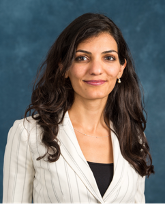
Multifunctional Regenerative Neural Interfaces
21st April 2021
Timing : 1 pm EDT
For zoom link to the talks, please email mjgc@mit.edu with your institute email and mention affiliation
For a list of all talks at the NanoBio seminar Series Spring'21, see here
Dena Shahriari
Assistant Professor,
UBC and ICORD, Vancouver, Canada
Dena Shahriari is a biomaterials scientist and a neural engineer. She is currently an Assistant Professor at the University of British Columbia (UBC) and the International Collaboration on Repair Discoveries (ICORD) at Vancouver, Canada. At UBC, she is the director of the BioAugmentative Interfaces laboratory which is at the intersection of Materials Science, Electrical Engineering and Medicine. Some of the missions of the lab are in providing nerve repair, developing prosthetic interfaces and improving organ function after paralysis. Dena obtained her BS from the University of California Berkeley and her PhD from the University of Michigan, Ann Arbor followed by postdoctoral fellowship with Prof. Polina Anikeeva at Massachusetts Institute of Technology. She is a recipient of the US Nasional Science Foundation Graduate Student Fellowship and the Craig H. Neilsen Spinal Cord Injury Postdoctoral Fellowship.
Assistant Professor,
UBC and ICORD, Vancouver, Canada
Dena Shahriari is a biomaterials scientist and a neural engineer. She is currently an Assistant Professor at the University of British Columbia (UBC) and the International Collaboration on Repair Discoveries (ICORD) at Vancouver, Canada. At UBC, she is the director of the BioAugmentative Interfaces laboratory which is at the intersection of Materials Science, Electrical Engineering and Medicine. Some of the missions of the lab are in providing nerve repair, developing prosthetic interfaces and improving organ function after paralysis. Dena obtained her BS from the University of California Berkeley and her PhD from the University of Michigan, Ann Arbor followed by postdoctoral fellowship with Prof. Polina Anikeeva at Massachusetts Institute of Technology. She is a recipient of the US Nasional Science Foundation Graduate Student Fellowship and the Craig H. Neilsen Spinal Cord Injury Postdoctoral Fellowship.
